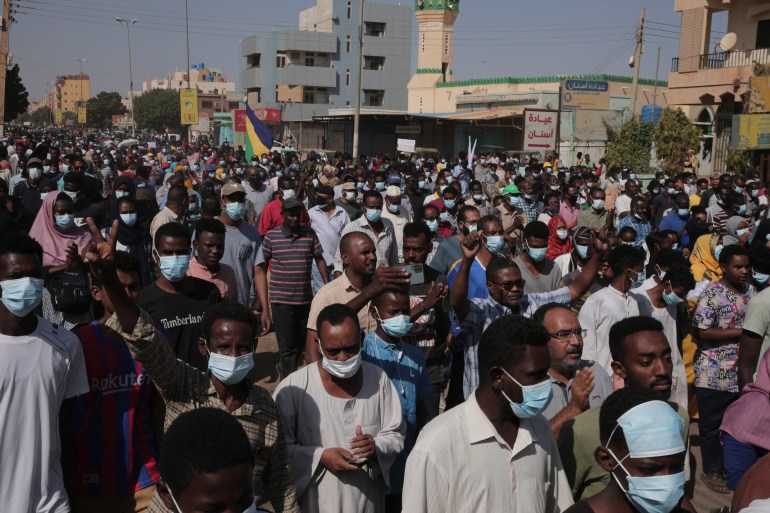Sudan security forces kill five anti-coup protesters, medics say | Protests News
Sudanese security forces have killed five anti-coup protesters and wounded dozens others during a crackdown on renewed pro-democracy protests, according to an independent union of medics.
At least two protesters were killed on Saturday from gunshots and one from a tear gas canister in the capital, Khartoum and its twin city of Omdurman, the Sudan Doctors Committee said, adding that others were wounded as demonstrators were “facing excessive repression using all forms of force including live bullets in several areas” of Khartoum.
Tens of thousands of protesters took to the streets of the capital and elsewhere to protest against last month’s coup and the creation of a new governing council by the head of the army this week that excluded any representatives from the civilian Forces of Freedom and Change coalition.
General Abdel Fattah al-Burhan on Thursday reappointed himself head of the Sovereign Council, while Mohamed Hamdan Dagalo, the leader of the feared paramilitary Rapid Support Forces who is also known as Hemeti, kept his post as deputy. The duo had been due to hand over the body’s leadership to civilians in the coming months.
The developments have angered the pro-democracy alliance and frustrated Western countries that have urged the military to reverse its coup.
“Protests are continuing, more and more people are joining the protests, they are chanting that they don’t want the military rule,” said Al Jazeera’s Resul Serdar, reporting from the protests in Khartoum.
He added that despite the heavy security presence, protesters seemed determined “to remain in the streets to show their resistance against military rule”.
 Pro-democracy protesters took to the streets across Sudan to rally against the military’s takeover last month [Marwan Ali/AP Photo]
Pro-democracy protesters took to the streets across Sudan to rally against the military’s takeover last month [Marwan Ali/AP Photo]The Sudanese military seized power on October 25, dissolving the transitional government and detaining dozens of officials and politicians, including Prime Minister Abdalla Hamdok who remains under house arrest. The takeover upended the country’s fragile planned transition to democratic rule, more than two years after a popular uprising forced the removal of longtime leader Omar al-Bashir.
Security forces on Saturday closed bridgebetween central Khartoum, Omdurman and Khartoum North to vehicles and pedestrians, laying barbed wire to block access. Roads to strategic sites were also shut.
As protesters began to gather in the early afternoon around the capital, security forces moved quickly to try to disperse them, firing tear gas and chasing demonstrators down side streets to try to prevent them reaching central meeting points.
“People were surprised that they fired the tear gas so early,” said one protester in Omdurman.
Protesters “retreated into the neighbourhood and barricaded the streets and now they’re coming back to the main road”.
Saturday’s protests were called by the Sudanese Professionals’ Association (SPA) and the Resistance Committees. Both groups have opposed the return to the power-sharing deal that established the deposed transitional government in August 2019. They demand the handover of the government to civilians to lead the transition to democracy, with other political parties and movements joining the call.
Witnesses estimated the number of protesters around Khartoum to be in the tens of thousands.
“We’re not surprised by the people’s turnout because this is what’s been happening since October 25,” Samahir El Mubarak, SPA spokeswoman, told Al Jazeera from Khartoum.
“This is the voice of the Sudanese people refusing al-Burhan, refusing the military coup and refusing his council, and deeming this entire partnership invalid and totally refused by everybody.
“Unfortunately and as usually, these peaceful protests on the ground are being faced with tear gas, are being faced with gunshots.
“The number of protesters is increasing. Protesters are setting up barricades to try and protect themselves from the trucks and the vehicles of the joint forces that are facing the protesters,” El Mubarak said.
There was no immediate comment from security forces, but al-Burhan has previously said peaceful protests are allowed and the military does not kill protesters.
Earlier, the United Nations envoy in Sudan, Volker Perthes, had urged security forces to “exercise utmost restraint” during the planned protests and called for demonstrators to “maintain the principle of peaceful protest”.
Since the takeover, at least 17 anti-coup protesters have been killed due to excessive force by the country’s security forces, according to doctors.
Ongoing mediation efforts seek to find a way out of the crisis.
Perthes said he held “good discussions” on Friday with representatives of the resistance committees in Khartoum, civil society activists and Mohammed Hassan al-Taishi, who was a civilian member of the dissolved sovereign council. Nasredeen Abdulbari, justice minister of the deposed government, also took part.
Yohannes Woldemariam, lecturer in international relations at George Mason University, told Al Jazeera that protesters would continue demanding a civilian government.
“The Sudanese people are not going to settle for a military dictatorship,” he said. “Al-Burhan is basically trying to save his skin, he’s implicated in a lot of crimes within Sudan, as well as Hemeti. These guys are wanting to evade accountability.”
